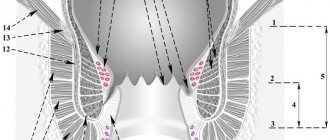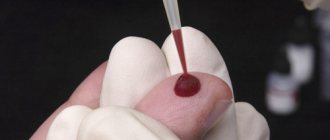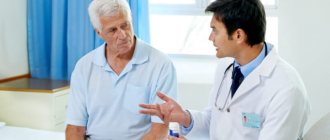Hemorrhoids in the initial stages can develop completely unnoticed by the patient. People do not experience significant discomfort...
... only after defecation they may experience unpleasant sensations, which at first quickly pass. Further, as the problem develops, itching in the anus may occur, as well as pain. Over time, after defecation, the aching pain in the anus begins to intensify, and there may be a feeling of a foreign body in the anus.
As the disease develops, a person begins to notice blood on their underwear or toilet paper. These may be smears or small droplets; you should definitely pay attention to them. The sooner the patient gets an appointment, the faster the treatment will take place.
All of the above symptoms may indicate the presence of hemorrhoids. However, only a doctor can make an accurate diagnosis, excluding cracks and other diseases. Therefore, under no circumstances should you go to the pharmacy and self-medicate. A visit to an experienced specialist will allow you to establish an accurate diagnosis and receive the most effective treatment regimen. Only a specialized specialist with sufficient experience can prescribe drugs that will be most effective in each specific case.
What are hemorrhoids?
This disease represents pathological changes in external and internal hemorrhoids. The cause of pronounced pain is precisely the external nodes.
The internal nodes are located in the submucosal layer of the rectum. It is not possible to detect them in the initial stages. They become visible to the naked eye only in the later stages of the disease. The presence of blood in the stool and pain during bowel movements are the main symptoms. Untimely treatment of the disease in the early stages leads to prolapse of hemorrhoids from the anal canal.
External hemorrhoids form nodes that arise in the lower venous plexus, which is located directly at the anus. A specialist can visually examine such a disease, since the formations are located outside the rectum. Most often, there is no bleeding with such pathological changes. In this case, patients begin to experience acute pain. Hemorrhoids can evolve into oncology, which can occur due to the possibility of injury to them by underwear and the occurrence of inflammatory processes.
In some patients in whom hemorrhoids are of a combined nature. In this case, changes occur both in the rectum and in the subcutaneous venous plexus located in the anal area.
Possible complications
Due to the fact that internal hemorrhoids are much more difficult to diagnose than external hemorrhoids, you can skip the period of possible effective treatment. The effectiveness of all procedures aimed at combating the disease depends on the period in which the patient sought help at the hospital. It is very important for both women and men to pay great attention to their health and undergo regular, complete examinations whenever possible. If, nevertheless, the onset of the disease is missed, then this can lead to such troubles as anemia, strangulation of the node and the occurrence of thrombosis. Anemia occurs due to the fact that a person begins to lose blood with each bowel movement, and with each subsequent time more and more. A lack of hemoglobin will result in weakness, rapid fatigue, and a constant desire to lie down and rest. Thrombosis of hemorrhoids is formed due to the fact that blood stagnates in the area of the body responsible for emptying. Severe pain is the main characteristic of this problem. If inflammation is added to this, then you may encounter an even greater problem - damage to the perirectal tissue.
Why do hemorrhoids develop?
Hemorrhoids can occur for completely different reasons.
Most often, the factors that caused changes in blood supply, stagnation and formation of hemorrhoids are:
- sedentary lifestyle. People who, due to their profession or other reasons, move little, are more susceptible to hemorrhoids. Deterioration of pelvic blood flow is a consequence of prolonged sitting or standing, which provokes the formation of hemorrhoids;
- hard physical labor. Lifting weights and other stress on the body can cause the development of the disease;
- any disturbances in the process of defecation. Diarrhea and diarrhea cause changes in pressure in the veins, so hemorrhoids can form;
- overheating or hypothermia of the body. They can contribute to the deterioration of blood supply in the pelvic area;
- spicy food, alcohol. They cause blood flow to the rectum, which can cause its tissues to expand. If there is insufficient fiber in the diet, constipation is possible; excessive fat content can cause diarrhea;
- anal sex leading to injury to the rectum;
- the presence of other diseases, including neoplasms in the pelvic area, liver disease.
Features of diet in men
The disease often occurs in representatives of the stronger sex. This is explained by the fact that men smoke much more, abuse alcohol, and also lead a sedentary lifestyle. These negative factors cause circulatory problems and the appearance of hemorrhoids. Over the years, this situation worsens, which causes the appearance of clinical symptoms.
If a man, in addition to everything else, suffers from constipation, then hemorrhoids will definitely manifest themselves. To avoid the occurrence of such an unpleasant disease, you should treat your diet with full responsibility.
The basis of the diet for men is a complete rejection of poorly digestible, fatty and heavy foods.
Alcoholic drinks will also be strictly prohibited. Men need to eat 5 to 7 times a day, and we must not forget about the correct drinking regime. If working conditions do not allow you to eat food fully and in a timely manner, at a minimum you should not forget about periodic snacks.
A diet for hemorrhoids for men should consist of cereals, vegetable stews, and lean soups. Dishes must be prepared without fat or oil. The bread in the diet should be made from rye flour. It is important to include as many fresh vegetables, fruits and dairy products in the menu as possible.
Why do hemorrhoids appear after childbirth?
During pregnancy, pressure on the pelvic organs increases. As a result, compression of the hemorrhoidal veins in the rectum is observed, since the uterus significantly increases in size. As a result, the outflow of blood from the rectum is disrupted, vascular congestion, stagnation and the formation of nodes occur.
Pregnancy is often accompanied by constipation. In this case, the feces injure the cavernous bodies when the walls of the rectum are stretched. In the last trimester of pregnancy, a woman's lifestyle most often becomes sedentary, which also has a negative impact on her health.
During childbirth, there is a strong tension in the muscles of the perineum. This causes injury to the cavernous bodies of the rectum. If the perineal muscles are severely stretched, the likelihood of weakening the anal sphincter increases, which can lead to prolapse of hemorrhoids.
It is important to pay careful attention to your own health after childbirth. If you have the slightest discomfort in the anus, pain or blood in your stool or underwear, you should immediately consult a doctor. Any delay will lead to further development of the disease, which will subsequently significantly complicate treatment.
When is surgery needed? Do I need to remove hemorrhoids?
There are several stages of development of the disease:
With the first there are no pronounced symptoms. As a rule, they appear only in certain situations. The patient may experience itching, burning and discomfort during bowel movements. Treatment at this stage allows you to quickly get rid of the problem.
At the second stage, there is a significant increase in the size of the nodes. Due to the thinning of the walls of the nodes during defecation, hypothermia, overheating or physical exertion, traces of blood appear on toilet paper or underwear. There is a possibility of the nodes falling out during defecation, but they are able to move into place on their own. Conservative treatment at this stage is also effective. Modern medicine has effective methods to combat the manifestations of hemorrhoids.
The third stage is characterized by dystrophic changes in the anal sphincter. As a result, dropped nodes can be put back in only manually. Conservative treatment at this stage is no longer effective. The patient experiences severe itching, pain, and bleeding becomes more profuse.
At the fourth stage, repositioning the nodes inward is almost impossible due to weakening of the anal muscles. Not only the nodes, but also nearby tissues can become inflamed.
Medicine today successfully treats the first two stages of the disease. If the problem reaches the third or fourth stage, then surgical intervention and removal of nodes will no longer be possible. Therefore, it is extremely important to immediately contact a proctologist at the first symptoms.
Hygienic prohibitions
The main hygienic prohibitions for varicose hemorrhoidal veins are that you should not take a bath or use toilet paper. During periods of exacerbations, it is better to give preference to a shower rather than a bath. In general, cool sitz baths based on medicinal plants are of great benefit in the treatment of hemorrhoids. To prepare them, you can use oak bark or chamomile.
As for the ban on toilet paper, it is worth understanding that even the softest paper for the inflamed skin of the anorectal area will create a sandpaper effect. First you need to do everything to reduce trauma to irritated skin.
Remember that any friction can slow down the regeneration processes. You can use wet wipes or simply dampen toilet paper with water. After each act of defecation, a shower is recommended.
Is it possible to cure hemorrhoids without surgery?
If the disease is at the first or second stage, you should ask your doctor about surgical treatment. Conservative methods in this situation work perfectly and provide patients with the opportunity to completely get rid of the problem.
To treat the disease in the initial stages, drugs are widely used that can:
- relieve pain, relieve inflammation and swelling;
- prevent the formation of blood clots;
- improve the condition of blood vessels, make their walls stronger;
- normalize stool;
- stimulate blood circulation.
How are hemorrhoids treated?
The disease is treated using two methods: conservative and surgical. In the early stages, patients are prescribed a treatment regimen that includes oral and topical medications, as well as injections. The choice in favor of certain medications should be made by an experienced specialist after examination and thorough diagnosis. The treatment regimen for patients is individual and determined by the clinical picture, as well as the presence of other concomitant diseases (fissures, etc.), if any.
During surgical treatment, the nodes are excised. Latex ligation and infrared coagulation of hemorrhoids (not removal or laser treatment) are highly effective and minimally invasive methods in the treatment of proctological diseases, allowing the patient to be cured in the safest ways. After undergoing rehabilitation, the patient must strictly adhere to medical recommendations so that the disease does not develop again.
Is it possible to massage hemorrhoids?
Massage for this disease is an effective therapeutic procedure; this procedure is carried out as prescribed by a doctor and is indicated if the disease is not in an acute stage. With the help of this effect, you can relieve the patient of constipation and soften the stool. It is also used to stimulate blood supply, eliminate congestion, and increase tissue tone.
It is important that this procedure is carried out by an experienced specialist.
Massage treatment for illness has some contraindications:
- acute form;
- the presence of pathologies of the intestines and stomach;
- the presence of neoplasms in the pelvic area;
- gastrointestinal diseases;
- tuberculosis.
Do self-medication and folk remedies help in the fight against hemorrhoids?
This disease is serious, since tumor formations can degenerate into oncology. Therefore, self-medication is not only useless, but also absolutely irresponsible. It is important that when symptoms appear, putting aside false shame, contact a specialized specialist. The doctor will be able to make a comprehensive diagnosis, determine the extent of the disease and prescribe effective treatment.
Self-medication and folk remedies for hemorrhoids should not be used at all. They can only be auxiliary methods against the background of medications. But in any case, the use of traditional medicine methods must be approved by the treating specialist.
Is it possible to have a colonoscopy?
Colonoscopy is sometimes done for hemorrhoids, but there are a number of contraindications:
- paraproctitis;
- proctitis;
- colitis;
- postoperative period;
- There are also general limitations to this procedure, for example, myocardial infarction and weakening of the body.
Still, a colonoscopy helps a specialist assess the condition of the rectum. During this procedure, you can cauterize the venous node and stop the bleeding.
It is possible to give birth naturally with hemorrhoids
Prevention of hemorrhoids
It is important to avoid constipation. To do this, you will need to introduce fiber-rich foods into your daily diet. It is important to exclude alcohol and spicy foods, as well as seasonings. If you are prone to constipation, it is recommended to increase the volume of fluid you take daily. It is necessary to drink clean water in the amount of 6-8 glasses per day.
During defecation, you should not strain; everything should happen naturally. Otherwise, increased pressure will be created in the veins of the rectum, which is not safe. It is important to defecate in a timely manner; you should not postpone it, as this can lead to hardening of the stool, which, in turn, will complicate the process of their elimination.
Don't get carried away with even the safest laxatives. Their reception can be one-time if necessary. It is important to improve the functioning of the body so that all processes are regular and natural.
If you have a sedentary lifestyle, it is recommended to do exercises or other physical activity daily. If your work involves standing or sitting for a long time, you should take a short break every one and a half to two hours. It is important to avoid standing or sitting for too long. Otherwise, it will not be possible to avoid increasing pressure on the venous system of the rectal area.
General principles of diet
Meals for hemorrhoids should be fractional, overeating is prohibited. A small amount of food does not put excessive stress on the gastrointestinal tract, resulting in no overstrain in the abdominal cavity. If possible, meals should be taken at the same time of day. It is unacceptable to eat food that is too cold or hot.
The last meal should be 1.5-2 hours before bedtime, and ideally 3-4 hours.
The finished dish should have a temperature from +37 to +40 °C.
An important factor is the rules for eating food: it must be chewed thoroughly, otherwise you can cause severe intestinal irritation or constipation, which will definitely not lead to anything good if you have hemorrhoids. Patients should limit their salt intake, because it dilates blood vessels.
Are ointments effective against hemorrhoids?
Modern pharmacological companies have developed various drugs designed to combat this disease. They are effective if you undergo comprehensive treatment under the guidance of a specialized specialist. You should not just go to the pharmacy and buy any ointment. Without being a specialist in this field, you will not be able to determine the clinical picture. Therefore, there is no need to talk about the correct choice of ointment or other drug.
Self-medication will not help get rid of the disease, since patients with hemorrhoids need complex therapy. This treatment regimen should be prescribed by an experienced specialist in accordance with the characteristics of the clinical picture of the disease. Hemorrhoids of the first and second stages are highly treatable. You just need to find time to visit a doctor and consult. Today, there are a sufficient number of drugs for the treatment of hemorrhoids. Experienced doctors are able to effectively help every patient facing this problem.
Remember, the sooner you contact a proctologist, the faster and easier the treatment process will be. You should not let the disease progress as this may lead to the need for surgery. Also, hemorrhoids are dangerous because they can degenerate into oncology.
Can you eat the seeds?
This issue causes controversy among experts. Some people categorically claim that seeds are a difficult product to digest, so you shouldn’t eat them. Others argue that the presence of oils and fiber in the seeds helps normalize stool, which is so important in the treatment of hemorrhoids. There are those who say that this product should be used with great caution, since shells that accidentally enter the body can cause additional bleeding and damage.
Which doctor should I see for hemorrhoids?
When the first symptoms occur or an exacerbation of an existing disease occurs, it is important to immediately make an appointment with a proctologist. An experienced specialist will help eliminate pain and create an effective treatment regimen. It is important to follow the instructions, as well as normalize your diet to ensure regular bowel movements and the absence of constipation. Experienced specialists will be able to effectively help every patient. The main thing is not to delay your visit to the doctor.
2
0
1
Article rating:
3.75 out of 5 based on 12 ratings
Author: Kutepova Ekaterina Vladimirovna
Surgeon-proctologist. Candidate of Medical Sciences. Highest category. Work experience 15 years.
Prohibited and permitted products
There are not so many foods that are prohibited for people with hemorrhoids. In addition, if on one of the holidays you allowed yourself to eat some product from this list, this does not mean that the disease will immediately manifest itself as pain. Every patient should know about permitted and prohibited products:
| It's good to eat | It's harmful to eat |
| bran, vegetables | rice, pasta, semolina; |
| berries, fruits | fried and spicy foods; |
| lean fish and meats | canned and pickled foods |
| dried apricots, prunes, figs | fresh baked goods, chocolate |
| Rye bread | strong coffee, tea |
| kefir, curdled milk, fermented baked milk | legumes, mushrooms, radishes |
During periods of exacerbation of the disease, it is important to adhere to a strict diet. Patients should exclude fast food, processed foods, fast food, crackers and chips from their diet. Sandwiches should not replace a plate of liquid food during lunch, because... dry food can cause constipation.








